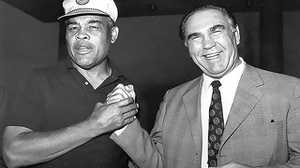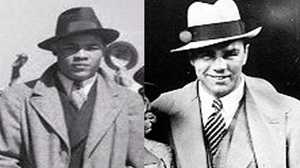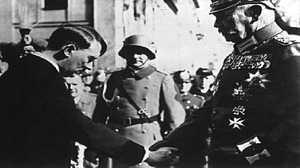Boxing Promotion in New York City

It would not be hard to argue that boxing exists to make money. Champion boxers are the best paid athletes in the world — but the businessmen behind the bouts see the greatest profits. The same was true in Joe Louis's day.
No Market for Black Boxers
In 1935, Joe Louis was ready for the big time -- New York City. But Louis's cynical trainer, Chappie Blackburn, suspected that a black boxer with black managers would never get a chance to compete. When his camp approached the boxing promoter James J. Johnston about hosting a fight at Madison Square Garden, Johnston turned them down. As Blackburn predicted, race was an issue, but only insofar as it affected receipts. Johnston figured a black boxer would not be a good draw, and he would not be able to recoup the costs for the fight.
The Right Promoter
It was around this time that Mike Jacobs -- "a true hustler," Joe called him -- recognized Louis's talent and draw. More importantly, Jacobs knew how to get publicity. The Hearst Milk Fund, established by newspaper magnate William Randolph Hearst and run by his wife, raised money to buy milk for poor children. The Fund had set up fights at Madison Square Garden in exchange for a percentage of ticket sales going to the charity. Jacobs offered the Hearst Fund a lower overhead and a generous portion of the gate. He brought them on board his new operation -- the Twentieth Century Sporting Club -- to challenge Madison Square Garden's monopoly. The club was incorporated with three reporters from the Hearst press: Damon Runyon, Bill Farnsworth, and Ed Frayne. The sportswriters got special access to Jacobs's fighters, and their effusive headlines created incredible anticipation for each fight.
National Conflicts in the Ring
For the Twentieth Century Club to really succeed, though, Jacobs needed a world champion. That's where Joe Louis came in. As interest in Louis grew, Jacobs set up a fight with a powerful Italian boxer, Primo Carnera, at Yankee Stadium. In 1934, the match seemed like a metaphor for Italian dictator Benito Mussolini's military advances on Ethiopia. The small independent African nation, led by the charismatic Haile Selassie, symbolized the plight of peoples' of color in their struggle against racism and imperialism. When the Hearst group began backing away from the fight to avoid political tension, Louis offered them ten percent of his purse -- and then went on to knock out Carnera in six rounds. The Hearst reporters' involvement was critical to making Louis a star.
Working Both Sides
Mike Jacobs visited one of Louis's next opponents during training. Max Schmeling recalled the visit: "He silently watched me work for about an hour. Then he came up to me and offered me a contract in the event that I beat Louis. He didn't say a word about my chances, but he was no fool." In a system where promoters held contracts with both sides, the businessman was sure to come on top. Still, these were no ordinary businessmen.
Dark Doings
In his autobiography, Louis relates that after losing to Schmeling, he fought Bob Pastor, a Madison Square Garden fighter. While Louis was getting ready for the fight, Jimmy Johnston and four toughs forced their way into his dressing room. Louis's bodyguards drew their weapons before they realized Johnston's henchmen were policemen. When Louis's manager threatened to cancel the fight, the intruders left. The fighter was never certain whether the interruption was meant to rattle him or to spy on his preparations.
Controlling the Heavyweight Title
Schmeling, meanwhile, found himself waiting endlessly for the title bout with Jimmy Braddock for which he had inked a contract. Braddock delayed the dates, claiming injuries, and then failed to show up for the fight. Underlying his delay was the American fear that Schmeling might take the title to Europe and refuse to return to defend it. Years later, Mike Jacobs would admit that a combination of management and promoters intentionally stymied the German's plans at every turn. Whether for money or for patriotism, Jacobs derailed the Schmeling-Braddock matchup. He surely feared losing control of the cash cow of boxing -- the heavyweight champ.
Broken Monopoly
Instead of Schmeling, Louis got the chance to fight Braddock, another Madison Square Garden fighter. The Garden challenged the legality of the contract, but a judge determined that the Louis vs. Braddock contract was the only document with validity. The Supreme Court upheld that decision and Louis got his title bout. Perhaps more importantly for the business of boxing, the highest court in the land gave Louis the opportunity to break up Jimmy Johnston's monopoly on heavyweight boxing.







